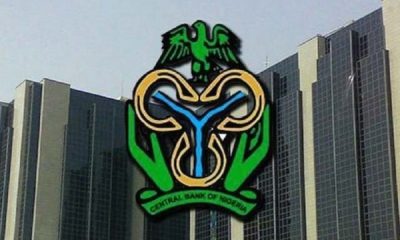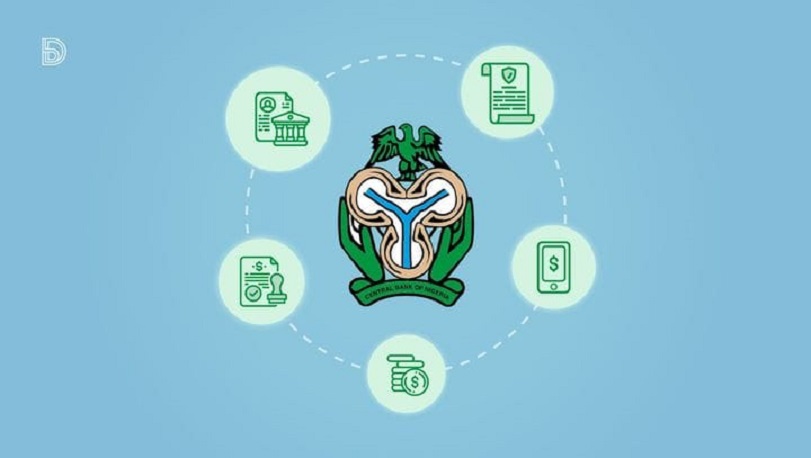Banking
EXPLAINER: Understanding CBN’s 0.5% Cybersecurity Levy

By Adedapo Adesanya
On Monday, May 6, 2024, the Central Bank of Nigeria (CBN) directed all financial institutions, including commercial banks and others to deduct a 0.5 per cent cybersecurity levy on electronic transfers as stipulated in the Cybercrime (Prohibition, Prevention, etc) (Amendment) Act 2024.
The directive has since created an uproar among Nigerians as they interpreted it to be that the 0.5 per cent fee would be charged on the value of the funds transferred electronically. For instance, a sum of N1,000 will attract N5, N2,000 to attract N10, N5,000 to attract N50, and so on.
But from the explanation given by the CBN in 2018 when this policy was first implemented, the cybersecurity fee is levied on the service charge by the financial institutions from the originator of the transaction.
For example, if the service charge on the transfer of N10,000 is N50, the 0.5 per cent cybersecurity levy will be charged on the N50, not N10,000, which means apart from paying N50 for Electronic Money Transfer Levy (EMTL), 7.5 per cent Value-Added Tax (VAT), and other fees, the customer will likely pay 25 Kobo as an additional fee for the transaction.
This development is not new. The Cybersecurity Act was first passed in 2015 and introduced a 0.005 per cent levy on electronic transfers. In June 2018, the CBN implemented the policy and directed banks to collect the levy on “electronic transactions occurring in a bank or on a mobile money scheme or any other payment platform that have an accompanying service charge.”
It was explained in 2018 through Mr Dipo Fatokun, who was then the Director Banking and Payments System Department, that “Electronic transactions shall be all financial transactions occurring in the bank or on a Mobile Money Scheme or any other payment platform that have an accompanying service charge; the levy shall be 0.005 per cent of the service charge (exclusive of all tax effects) from all electronic financial transactions occurring in a bank, a Mobile Money Scheme and other Payment Platforms.
“All electronic transactions (both inter and intra) that have an accompanying service charge shall qualify as eligible transactions; the effective date of collection shall be with effect from July 1, 2018.”
Now, the levy has been increased by 900 per cent and covers fintechs, payment service providers, and other financial institutions. These institutions have been mandated to remit the monies to the National Cybersecurity Fund (NCF), which would be administered by the Office of the National Security Adviser (ONSA).
In the latest circular signed by the Director of the Payments System Management Department of the CBN, Mr Chibuzo Efobi; and the Director of the Financial Policy and Regulation Department, Mr Haruna Mustafa, the apex bank emphasised that failure to remit the fees is an offence as stated in Section 44 (8) of the Act and will attract a conviction of not less than 2 per cent of the annual turnover of the defaulting business, amongst others.
“Following the enactment of the Cybercrime (Prohibition, Prevention, etc) (Amendment) Act 2024 and pursuant to the provision of Section 44 (2)(a) of the Act, ‘a levy of 0.5% (0.005) equivalent to a half per cent of all electronic transactions value by the business specified in the Second Schedule of the Act,’ is to be remitted to the National Cybersecurity Fund, which shall be administered by the Office of the National Security Adviser,” a part of the notice said.
While the outbursts have continued, many have also justified the need for the charge, especially with fraud prevalent in the Nigerian financial ecosystem.
Available data released by the Financial Institutions Training Centre (FITC) showed that Nigerian banks lost N2.09 billion to frauds in the fourth quarter of 2023, with mobile emerging as the top channel through which the largest amount was lost.
According to the report, the N2.09 billion loss recorded in Q4 was a 77.58 per cent increase from the N1.18 billion recorded by the banks in Q3 2024.
There are also indicators that the number might be higher this year, with the CBN forcing the hands of neobanks like Opay, MoniePoint, PalmPay, and Kuda not to open new accounts.
Despite this new fund, it is not all gloomy as 16 banking transactions are exempted from the CBN’s new cybersecurity levy.
These are Loan disbursements and repayments; Salary payments; Intra-account transfers within the same bank or between different banks for the same customer; Intra-bank transfers between customers of the same bank, Other Financial Institutions’ instructions to their correspondent banks; Interbank placements; Banks’ transfers to CBN and vice-versa; Inter-branch transfers within a bank; and Cheque clearing and settlements.
Others are Letters of Credit; Banks’ recapitalisation-related funding – only bulk funds movement from collection accounts; Savings and deposits, including transactions involving long-term investments such as Treasury Bills, Bonds, and Commercial Papers; Government Social Welfare Programmes transactions e.g. Pension payments; Non-profit and charitable transactions, including donations to registered non-profit organisations or charities; Educational institutions’ transactions, including tuition payments and other transactions involving schools, universities, or other educational institutions; as well as transactions involving the bank’s internal accounts such as suspense accounts, clearing accounts, profit and loss accounts, inter-branch accounts, reserve accounts, nostro and vostro accounts, and escrow accounts.
Banking
Public Offer: Sterling Holdco Allots 13.812 billion Shares to 18,276 Shareholders

By Aduragbemi Omiyale
Sterling Financial Holdings Company Plc has allotted shares from its public offer of 2025 to investors with valid applications.
The allotment follows the earlier receipt of final approval from the Central Bank of Nigeria (CBN) and the recent clearance by the Securities and Exchange Commission (SEC).
In September 2025, the financial institution offered for sale about 12,581,000,000 ordinary shares of 50 kobo each at N7.00 per share in public offer.
However, the exercise received wide participation from the investing public, with the company getting 18,280 applications for 16,839,524,401 ordinary shares valued at approximately N117.88 billion.
Following a thorough verification process, valid applications were received from 18,276 shareholders for a total of 13,812,239,000 ordinary shares, representing a subscription level of 109.79 per cent and reflecting sustained confidence in Sterling Holdco’s strategic direction, governance, and long-term growth prospects.
The firm approached the capital market for additional funds for the recapitalisation of its two flagship subsidiaries, Sterling Bank and The Alternative Bank.
The capital injection will support the commencement of full operations and contribute to the group’s revenue diversification objectives.
In line with the guidelines set out in the offer prospectus, Sterling Holdco confirmed that all valid applications will be allotted in full. Every investor who complied with the terms of the offer will receive all the shares for which they applied.
A very small number of applications were not processed or were partially rejected due to non-compliance with the offer terms, including duplicate payments and failure to meet the minimum subscription requirement of 1,000 units or its multiples, as stipulated in the offer documents.
The group ensures a seamless post-offer process, with refunds for excess or rejected applications, along with applicable interest, to be remitted via Real Time Gross Settlement or NIBSS Electronic Funds Transfer directly to the bank accounts detailed in the application forms.
Simultaneously, the electronic allotment of shares has be credited to successful shareholders’ accounts with the Central Securities Clearing System (CSCS) on February 17, and for applicants who do not currently have CSCS accounts, their allotted shares will be temporarily held in a registrar-managed pool account pending the submission of their completed account opening documentation to Pace Registrars Limited, after which the shares will be transferred to their personal CSCS accounts.
Banking
CBN Governor Seeks Coordinated Digital Payment Reforms

By Modupe Gbadeyanka
To drive inclusive growth, strengthen financial stability, and deepen global financial integration across developing economies, there must be coordinated reforms in digital cross-border payments.
This was the submission of the Governor of the Central Bank of Nigeria (CBN), Mr Olayemi Cardoso, at the G‑24 Technical Group Meetings in Abuja on Thursday, February 19, 2026.
According to him, high remittance costs, settlement delays, fragmented systems, and heavy compliance burdens still limit the participation of households and Micro, Small and Medium Enterprises (MSMEs) in global trade.
The central banker emphasised that efficient payment systems are essential for economic inclusion, highlighting that global remittance corridors still incur average costs above 6 per cent, with settlement delays of several days, excluding millions from modern economic activity.
Mr Cardoso cautioned that while digital payments present significant opportunities, they also carry risks such as currency substitution, weakened monetary transmission, increased FX volatility, capital-flow pressures, and regulatory fragmentation.
The G-24 TGM 2026, themed Mobilising finance for sustainable, inclusive, and job-rich transformation, convened global financial stakeholders to advance the modernisation of finance in support of emerging and developing economies.
The CBN chief reaffirmed Nigeria’s commitment to working with G-24 members, the IMF, the World Bank Group, and other partners to build a more inclusive, resilient, and development-oriented global financial architecture.
“We have strengthened our AML/CFT frameworks in line with FATF guidelines, requiring strict dual-screening of cross-border transactions to mitigate risks.
“To deepen regional integration, the CBN introduced simplified KYC/AML requirements for low-value cross-border transactions to encourage broader participation in PAPSS, easing processes for Nigerian SMEs and enabling faster intra-African trade payments.
“We have also embraced fintech innovation through our Regulatory Sandbox, allowing payment-focused fintechs to test secure, instant cross-border solutions under close CBN supervision,” he disclosed.

Banking
Unity Bank, Providus Bank Merger Awaits Final Court Approval

By Modupe Gbadeyanka
The merger and business combination between Unity Bank Plc and Providus Bank Limited remains firmly on course, a statement from one of the parties disclosed.
According to Unity Bank, there is no iota of truth in reports in certain sections of the media suggesting that the merger process had stalled, as the transaction remains firmly on track.
It was disclosed that the necessary regulatory steps have been completed, but only a few other steps to finalise the transaction, especially the final court sanction.
There had been speculations that both lenders may not meet the new minimum capital requirement of the Central Bank of Nigeria (CBN) before the March 31, 2026, deadline.
However, it was noted that the combined capital base of Unity Bank and Providus Bank exceeds N200 billion, which is the minimum requirement to retain a national banking licence under the CBN’s recapitalisation framework.
When completed, the Unity-Providus merger is expected to deliver a stronger, more competitive, and customer-centric financial institution — one with the scale, innovation, and reach to redefine the retail and SME banking landscape in Nigeria.
“The merger with Providus Bank significantly enhances our capital base, operational capacity, and strategic positioning.
“We are confident that the combined institution will be better equipped to support economic growth and deliver innovative financial solutions across Nigeria,” the chief executive of Unity Bank, Mr Ebenezer Kolawole, stated.
Recall that a few months ago, shareholders authorised the merger between the two entities at Court-Ordered Meetings. They also adopted the scheme of merger at their respective Extraordinary General Meetings (EGMs) in September 2025,
The central bank also backed the merger, with a pivotal financial accommodation to support the transaction. The merger also received a further boost with a “no objection” nod from the Securities and Exchange Commission (SEC).
The regulatory approvals form part of broader efforts to strengthen the resilience of Nigeria’s banking system, reinforce capital adequacy across the sector, and mitigate potential systemic risks.
The development positions the combined entity among the 21 banks that have satisfied the apex bank’s new capital threshold for national banking operations.
-

 Feature/OPED6 years ago
Feature/OPED6 years agoDavos was Different this year
-
Travel/Tourism10 years ago
Lagos Seals Western Lodge Hotel In Ikorodu
-

 Showbiz3 years ago
Showbiz3 years agoEstranged Lover Releases Videos of Empress Njamah Bathing
-

 Banking8 years ago
Banking8 years agoSort Codes of GTBank Branches in Nigeria
-

 Economy3 years ago
Economy3 years agoSubsidy Removal: CNG at N130 Per Litre Cheaper Than Petrol—IPMAN
-

 Banking3 years ago
Banking3 years agoSort Codes of UBA Branches in Nigeria
-

 Banking3 years ago
Banking3 years agoFirst Bank Announces Planned Downtime
-

 Sports3 years ago
Sports3 years agoHighest Paid Nigerian Footballer – How Much Do Nigerian Footballers Earn





















